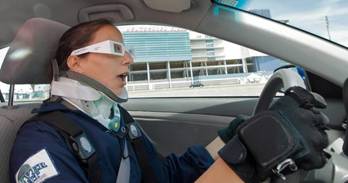|
A Difficult Drive in a Suit Designed to Mimic Effects of Aging
By Vivian
Nereim, The Boston Globe
June
18, 2009

Steve
Miller for The
Boston
Globe
The frustration sank in the moment I got in the car. I couldn't reach the brake. Adjusting the driver's seat seemed simple, but my back was stiff, my knees were stuck, and my hands were heavy. I sheepishly asked my driving instructor, Stephen Smith, if he could help. It was embarrassing, but I couldn't do it on my own.
I was wearing a restrictive suit meant to simulate the bodily effects of aging as I fumbled through a closed driving course at Rentschler Field, practicing parking, navigating orange cones, and making emergency stops.
The suit and the course were part of a Liberty Mutual event on Wednesday marking the release of their "Driver Seat Game," an online video game designed to simulate the physical and cognitive limitations experienced by many elderly drivers. The game, which went live Tuesday morning, is accessible at
http://libertymutual.com/driverseat.
Ideally, said Greg Gordon, senior vice president of consumer marketing for the insurance company, the game will create empathy for elderly drivers and spark conversations between adult children and their elderly parents about whether it's time to hang up the keys.
The conversation could be easier than people think. According to a survey conducted by Liberty Mutual, while 58 percent of baby boomers think their parents would be uncomfortable talking about changing their driving habits, 92 percent of seniors said their children had a right to raise the issue.
The game's release comes at a pressing time: A recent string of Massachusetts accidents involving older drivers has prompted many to call for stronger oversight of elderly driving.
"Essentially, the current law is crazy," said state Senator Brian A. Joyce of Milton, who has renewed his push for legislation that would require drivers to pass a road or road-simulator test every five years beginning at age 85.
State Representative Kay Khan, of Newton, has also sponsored legislation on elderly driving, though she opposes an age-based approach, instead focusing on physical and cognitive impairment.
However, both Joyce and Khan said they believe the family plays a significant role in monitoring elderly drivers. "I think it's great for families to have these conversations," said Khan.
"We had that conversation with our father and it was a difficult conversation," said Joyce. "He was the best driver I ever knew, and at 89 he needed to stop driving. Reluctantly, he has."
While Elizabeth Dugan, associate professor of gerontology at the University of Massachusetts at Boston and coordinator of the Safe Roads Now Coalition, opposes age-based legislation, she agreed with Joyce and Khan that families must address the issue of elderly driving.
In this environment, said Dugan, "anything that can help adult children or concerned loved ones to have some empathy or insight into the challenges we face as we get older is probably a good thing." She said the suit is an interesting approach toward fostering that empathy.
While Liberty Mutual's suit is "extremely frustrating," said Vicki Rosebrook, executive director of the Macklin Intergenerational Institute, it is also "very realistic."
Rosebrook helped design the suit, a complex affair that includes weighted ankles and arms to mimic fatigue, a spinal strap to create a "hunch," knee braces to limit mobility, and weighted gloves to simulate symptoms of arthritis. During part of the course, drivers were asked to put on blurred glasses that limited peripheral vision.
While the physical, cognitive, and visual impairments of old age vary from person to person, said Dave Melton, director of transportation consulting services for Liberty Mutual, they are inevitable. Melton said he was most confounded by the neck brace.
I had to agree with Melton. Stymied by the neck brace, I faced total defeat at the hands of four green cones. Smith asked me to weave through the cones with the car in reverse. The brace made it impossible to see the road behind me. I spent several achingly slow minutes inching backward and forward, using my side mirrors ineffectively and muttering bad excuses: "I can't see the cones," and "I don't understand what you want me to do."
I left the car equal parts angry and humble.
More Information on US Elder Rights Issues
Copyright © Global Action on Aging
Terms of Use |
Privacy Policy | Contact
Us
|



